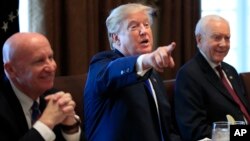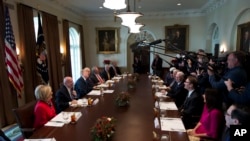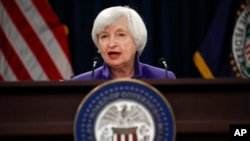President Donald Trump says if Congress sends him a tax bill by Christmas, Americans will start seeing lower taxes and bigger paychecks starting in February.
Trump spoke Wednesday in the White House as House and Senate negotiators appear to be very close to agreement on a single tax reform bill that can pass both houses and that the president would sign.
"We're very, very close to a historic legislative victory," Trump declared, sitting next to key House and Senate lawmakers who crafted the tax accord over the last several days.
"As a candidate, I promised we would pass a massive tax cut for the everyday working Americas who are the backbone and heartbeat of our country," he later said. "Now we are just days away from keeping that promise and delivering a truly amazing victory for American families. We want to give you, the American people, a giant tax cut for Christmas."
To bolster his insistence that the middle class will benefit from his tax plan, Trump let several working-class families speak for themselves, introducing small-business owners from across the country.
Standing at the presidential podium, they thanked Trump and said they would use the extra money from the tax cuts for various projects.
The bill would slice taxes by $1.5 trillion over the next decade. The majority of cuts would go to corporations who currently face a 35 percent tax rate.
Trump says this would lead to more job creation and more investment, and make U.S. industry more competitive in the global marketplace.
The White House says millions of individual taxpayers — but not everyone — would see their annual tax obligation to the government cut, in many cases by a few hundred dollars, or in the case of wealthy taxpayers, by thousands of dollars.
Critics in Congress
But the tax bill still has many critics in Congress, including some moderate Republicans. Not a single Democrat has come out in favor of the tax plan. They call it a gift to the wealthy, including billionaires such as Trump.
Some analysts say companies are more likely to use the tax cuts to give benefits to stockholders rather than invest in new factories to create jobs.
Outgoing Federal Reserve Chair Janet Yellen said Wednesday the tax bill would likely spark some economic growth, but how much remains to be seen.
"While changes in tax policy will likely provide some lift to economic activity in the coming years, the magnitude and timing of the macroeconomic effects of any tax package remain uncertain," she told reporters.
In addition to cutting taxes for many middle-class Americans, Trump says the tax bill will simplify a tax code he called "burdensome, complex, and profoundly unfair."
According to Trump, "this country was going in the wrong direction" on the economy when he took office last January. But the country's unemployment rate, now at 4.1 percent, is the lowest in 17 years, and major U.S. stock indexes have surged since Trump was elected, partly on a pledge to sharply cut corporate regulations, some of which he has carried out.
Senate and House negotiators have to agree on final tax details before lawmakers in both chambers vote on the bill — likely in the coming days — and send it to Trump for his signature.
With a Democrat, Doug Jones, winning a special Senate election Tuesday in Alabama, Senate Minority Leader Charles Schumer is asking that the final tax vote be delayed until January after Jones is sworn in. But Republicans appear intent on voting before then, while they have one more Republican vote in the Senate.
The tax legislation would be the first major legislative achievement of Trump's nearly 11-month presidency, after he and Republicans failed earlier this year to dismantle national health care policies championed by former President Barack Obama.






